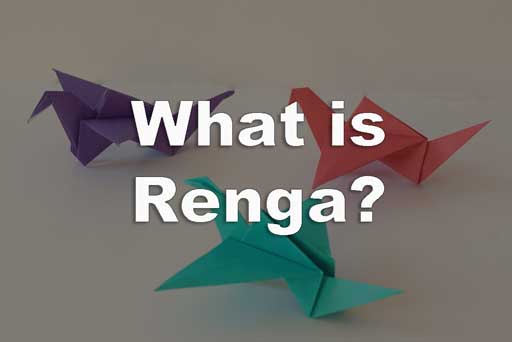What is Renga?

What is Renga?
All those who follow my haiku posts have probably seen mention of renga before, or renku which is a specific kind of renga, but you may have no idea what those actually are. My apologies, I often throw around terms with little explanation.
With that in mind, friends, let's take a moment—or a few hundred words, whichever comes first—to take a brief look at what exactly renga is.
So... What is Renga?
Renga is collaborative or linked poetry. There are many forms of it but the most popular is called haikai no renga or simply renku. You may see this style referred to by the full name (haikai no renga), shortened to haikai, as renku, or even as renga itself.
Basically renku is a series of alternating verses between poets, each one playing off of what came before, either building on the previous verse or using the final few words of the previous verse to spin off in a new direction. It was very much a game and was less serious than other kinds of poetry. At least it was at first—it later also became serious business. But I'll spare you the history lesson.
How Does It Work?
The first verse (called the hokku) was composes of 17 mora in a 5-7-5 pattern. Yes, exactly like haiku. Haiku originated as the hokku verse of renga and continued to be called hokku until the 19th century when Shiki renamed it.
Wait... What's a mora...? A sound unit. Usually translated as syllable but I disagree with that. We'll come back to this later in the article.
The second verse would be 14 mora in a 7-7 pattern. It has a name, but I don't want to get lost in terminology, so we will just call it the second verse.
We could end there, but if there is a third verse it would go back to a 17 5-7-5 pattern. And we go from there, alternating between a 17 mora verse and a 14 mora verse.
The final verse must be a 14 mora verse. In other words, the renga must end on a 14 mora verse, not a 17 mora verse.
Commonly renku would go on for 36 verses. Other forms of renga could go on for even longer. But these days when we do renga or renku, we don't worry about such rules. 2 or more verses is what we are aiming for.
Let's look at an example I'm making up on the spot.
Verse 1:
midday sun
even in winter
I am hot
Verse 2:
beneath a tall cypress tree
rest and grow cold again
That slight comic suggestion of the second verse is no accident. Haikai no renga literally means "comic linked verse".
Counting Syllables
We might translate mora† as syllable, as mentioned above, but that is inexact and I am not a fan of it. I wrote a post on it, in fact. Go read that post to see my reasons, but basically a syllable in English is longer than a mora in Japanese, meaning if we count the same number of syllables as they do mora the resulting poem is far too long.
In the example I gave above, you can see I did not stick to a hard 5-7-5 or 7-7 syllable count. I simply made them short. In Japan they say hokku should be one breath. The second verse of renga should also be close to that.
Now that is my opinion. In your own renga you can stick to counting syllables or not. Your call. However, as I mentioned in the article linked above if you want some kind of structure to guide you, I'd recommend a 3-5-3 syllable count for the hokku, and a 5-5 one for the second verse to bring them much closer to the original Japanese idea. But again this is very much your call.
Summary
Ok... that wasn't so brief. Maybe this will be: In summary renga is linked verse, alternating between verses of a short 3 line verse and a short 2 line verse.
If you are curious to experience this form yourself, we are putting together an area to practice the form at the Writers Block. Come join us and try your hand at it. More info will be provided in the Discord channel.
Footnotes
†: Morae is an English linguistic term for the concept, which the Japanese borrowed as mōra. You might sometimes see haku or on (pronounced ohn) referring to the same idea.

❦
| If you enjoyed this post, please like and resteem. Also be sure to follow me to see more from Japan everyday. |
|---|
I post one photo everyday, as well as a haiku and as time allows, videos, more Japanese history, and so on. Let me know if there is anything about Japan you would like to know more about or would like to see.
| Who is David? | |
|---|---|
 | David LaSpina is an American photographer lost in Japan, trying to capture the beauty of this country one photo at a time. |
I feel like i need to bookmark this and come back several times to fully absorb. I remember working with renga in grad school and thinking it had so much potential, but word choice is everything in constricted forms like this and I was there to study Fiction. ;)
You're so nice for commenting on this post. For that, I gave you a vote!
You should give it a shot. Word choice is everything, but then again, word choice isn't important. It's fun to practice, so stop by the writers block and practice with us if you have a chance.
Great primer on renga! I think you're exactly on track for the best way to "English" the form.
What are your opinions on seasonality and linking?
I don't see a need for them. I am firmly in the Hekigoto camp of free-verse -ku without the requirements of season words, cutting words, or syllable count. Specifically in regards to renga: to me, renga should be play. If we break out the renga rule book I think it takes away from the fun of the social event. On the writers block (please come join us) we are keeping it very casual and emphasizing fun over rules.
Most of my personal haiku actually do have season words, but that is just a personal quirk. I don't feel that should be required however.
Renga definitely is play, but as I think elementary school playgrounds show us, half the fun of playing is arguing about the rules. It helps to have some rules, if only to have fun bending/breaking them.
Where is the writers block renga group located? I'm have trouble locating it...
I can agree with that, about knowing the rules so you know when you are breaking them, when we are talking about haiku or tanka, but with renga... there are so many convoluted rules. Every verse of the common 36 verse renku had a rule. Of course even those old renga masters (like Basho) often ignored the rules when the meetings were of a more casual nature, which perhaps proves your point, but I think that is a lot to present to most casual poets, so I usually skip it. If folks really want to know, I have a detailed listing of all the rules in my bookshelf somewhere, but I think the spirit of renga was (at least originally) to have fun with a less serious kind of poetry (a break from the serious business of composing waka), so that is what I try to present.
Hmm... I've edited this post a few times, but none of my links seem to work. They are changing things up at the writers block, so maybe that is why. Here, try this link and follow their instructions --> http://www.mspfictionworkshop.com/how-to-join-the-workshop/ -- once you are in the group, you will have to introduce yourself and say hi and one of the mods will then give you access to all the channels (we've had to move to this system to fight all the spam). You will see the renga channel easily enough after that.
Nice post. Good info
Thanks :)
Great post. Excited to get going with this.
As am I! We will have to start it soon, after I'm recovered from my flu maybe.
Enjoying this
post, I pondered.
Time passed.
I made a reply,
but ran out of room.
constrained
by space
this isn't twitter
Gr8 article, I shall have to stop by the 'block' and check out that channel @dbooster maybe write a renga or two. Thanks for sharing
Absolutely—please do :)
Can't quite get it...i will have to come back and see again..
thanks for this i hope to get involved and share at the writers block, but i do not yet have permissions in there hope to soon tho, thanks for the inspiration
Ah, my mistake... we haven't started the renga game yet, so the room might still be locked. I will edit the post to point at the general room in the writers block. Please try again.
On a site I frequented we call this tanka 5/7/5/ 7//7 when written by one poet anyways.
Tanka does follow a 5/7/5/7/7 structure, that's true. Though it has a few other rules you have to follow making it somewhat different from even a two verse renga composed by the same person. In terms of sound unit structure only, most Japanese poetry looks alike, as verses of 7/7 and 5/7/5 in various combinations are the norm because Japanese tends to flow into those counts very very naturally.
Makes sense ... I have some tanka kicking around maybe I will post one later on and you can tell me what you think. You seem to have a lot of knowledge on the subject. Which I like:)
Sounds good. I'd love to see them.
I have one about time that has been well-recieved. I'll post it tonight. I just posted my Day 6 haiku though ... if your interested:)
This is very cool! I'm excited to participate and look forward to what we come up with :D
Me too! Thanks for the comment :)